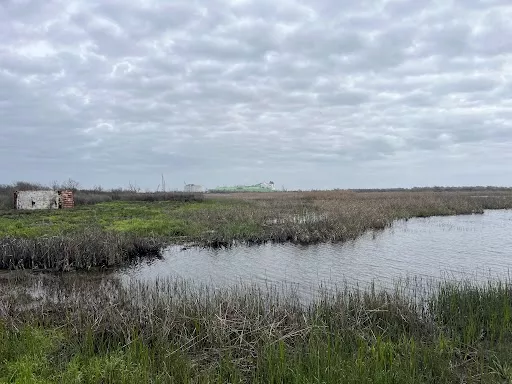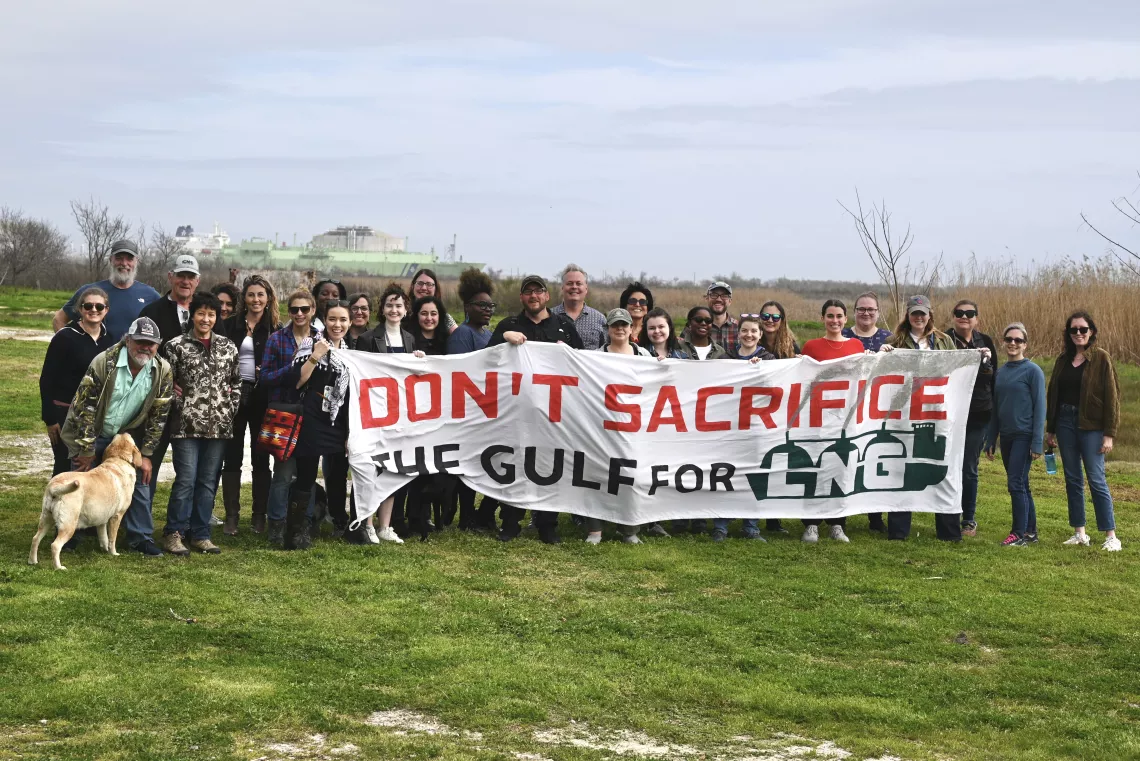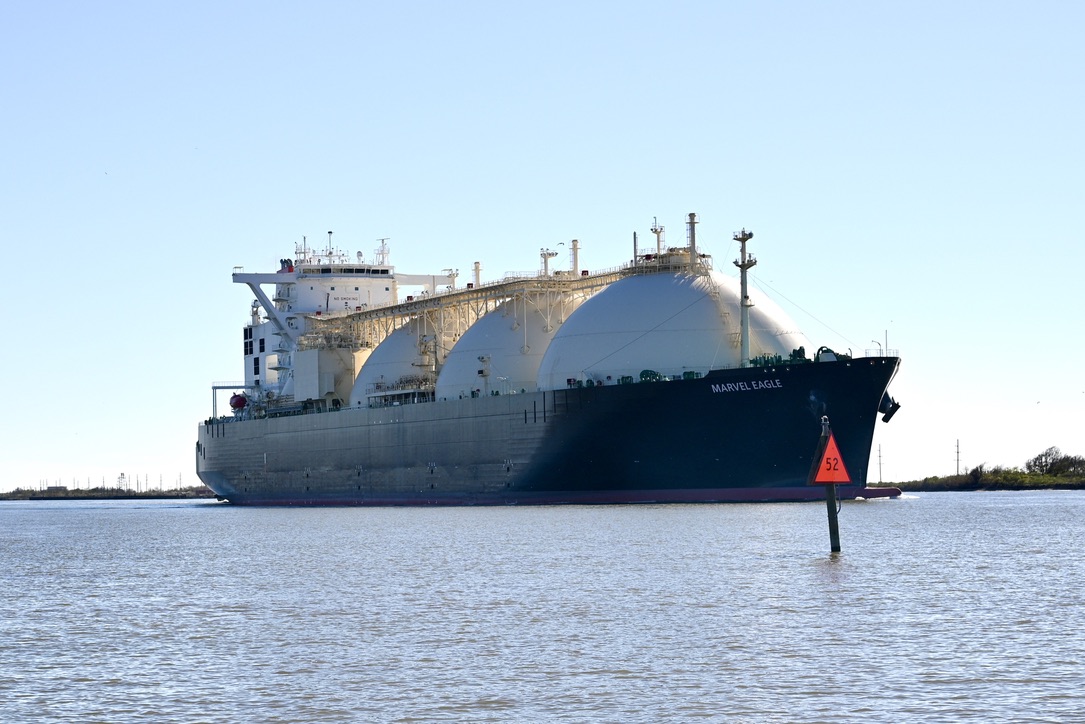The climate crisis is here. As much of the United States deals with unprecedented heat waves and record breaking temperatures, Texas and the Gulf Coast are recovering from damage caused by Hurricane Beryl, the earliest Category 5 hurricane ever to form in the Atlantic Ocean. Storms are not new to communities along the Gulf Coast, but climate change is making these storms increasingly frequent and intense.
Yet, in the face of this reality, the fossil fuel industry continues to forge ahead with plans to massively increase its capacity to liquefy and export methane gas from facilities mostly located along the Gulf Coast. Not only are methane gas exports, known as LNG, a major source of greenhouse gas emissions that supercharge the climate crisis, but the facilities destroy irreplaceable coastal ecosystems that provide flood protection.
The United States only started exporting gas as LNG in 2016 and has expanded at a record-breaking pace, with very little attention paid to the impact on local communities, the climate, or the economic impacts on domestic energy consumers.
The majority of existing and planned LNG terminals are located nearby low-income communities of color that are already overburdened by oil, gas, and petrochemical industrial pollution and climate change fueled natural disasters. Converting gas into a liquid for export releases pollutants that are known causes of respiratory disease and cancer.
Amid the devastation on the Gulf Coast and harm to the health of residents created by LNG export facilities, local community leaders have demanded change for years, but very little relief has come. Local officials are often beholden to the fossil fuel industry, and the federal government, including the Federal Energy Regulatory Commission (FERC) and the Department of Energy (DOE), have provided no buffer due to outdated or misguided regulations.

“Pausing” New Gas Exports
Back in January, it seemed that the tide would change. The campaign fighting back against expanded LNG exports scored a major victory when President Biden and Secretary of Energy Jennifer Granholm announced that the Department of Energy would temporarily pause its review of applications for new gas exports. The temporary pause was meant to give the agency time to ensure it has the most up-to-date and accurate studies upon which to determine whether or not approving new gas exports is in the best interest of the public (i.e., the agency’s public interest determination), with a specific focus on lifecycle greenhouse gas emissions and environmental justice.
The announcement of the pause was historic because it represents the very first time since gas exports began in this country that officials with oversight decided to take a step back to adequately review the true costs of this unfettered buildout of gas exports to the climate and environmental justice communities (something Sierra Club and partners had been asking DOE to do for ten years).
The studies that DOE has previously been relying on to make its public interest determination do not adequately reflect the pollution from these facilities from the fracking well to end use overseas, or the cost of this pollution. DOE’s outdated studies also incorrectly compare the lifecycle greenhouse gas emissions of US LNG to those of other fossil fuels, like coal, rather than making the relevant comparison against renewable energy. Saying one dirty fuel is cleaner than another dirty fuel does not make it clean. The government is also already aware of the fact that increased LNG exports directly result in higher energy prices for American consumers, yet this harm to consumers is also not reflected in DOE’s analyses.
If the updated analysis used for the public interest determination is done in a robust manner that truly accounts for the harms caused by gas exports, there should be no other choice but for DOE to find that approving more LNG exports are not “in the public interest” and reject any new and outstanding applications for export.
Republicans Attempt to Unpause the Pause
Gas export companies and Republican allies of the fossil fuel industry have fought back with lots of grandstanding, lies, and lawsuits in an effort to protect their record profits. Republicans have introduced countless amendments and riders to try and undermine the pause, moves that have yet to gain traction but are a clear signal that they are doing the bidding of the oil and gas industry.
In one federal lawsuit in the US District Court for the Western District of Louisiana, a Trump-appointed judge recently issued a preliminary injunction lifting the Biden administration's pause on gas export approvals. This ruling was disappointing, but it has minimal real world impact. While DOE now must continue its processing of LNG applications, it still has the authority and obligation to deny any export applications that are not in the public interest, and the agency is not forced to issue decisions on pending or new applications on a specific timeline. DOE can and must continue to update the studies that underlie the public interest determination. When DOE resumes decisions, using updated studies, there will be no other option but to reject an application.
Venture Global’s CP2 LNG proposal in Louisiana is perhaps the poster child demonstrating the need for updated studies. Leading up to the announcement of the pause by DOE, more than 300,000 people petitioned the agency to reject an export application for CP2. And with good reason – CP2 LNG would be a massive carbon bomb, and would be located adjacent to two other existing or proposed LNG facilities, subjecting nearby communities to devastating impacts to their public health and livelihoods. Despite robust opposition, FERC approved CP2 at its June meeting.
FERC Under the Microscope
FERC is another key federal agency we are pressuring to recognize the destructive nature of LNG and take action to reject these proposals. The independent agency consists of a bipartisan panel of five commissioners that are the primary approvers of the gas liquefaction facilities and export terminals themselves. FERC has never denied a permit for LNG.
However, we are fighting to ensure that FERC’s days as a rubber stamp for these projects are numbered. There are three newly confirmed commissioners now making decisions at FERC. We are working closely with community members and other experts to ensure those officials know what is at stake with LNG exports.
In some cases, the courts are on our side. In July, the US Court of Appeals for the DC District agreed with other favorable rulings in lawsuits filed last year by Sierra Club and other environmental and community organizations. The court said FERC failed to fully and adequately assess the cumulative and direct environmental and health impacts resulting from air pollution that would be generated by the proposed Commonwealth LNG facility. A proper effects analysis is required by the National Environmental Policy Act and Natural Gas Act. The court returned the decision to FERC for reconsideration and evaluation.

What’s Next & How You Can Help
While there is so much at stake if we allow for the continued expansion of methane gas exports, a better future is indeed possible. This includes affordable energy for American families, meeting our climate goals, and protecting the health and livelihoods of people who call the Gulf Coast home.
Entrenched fossil fuel interests are powerful, but we are stronger. We will not stop fighting for a just and equitable future.
What hasn’t changed since the start of 2024 is our collective opportunity to shape the analysis that the Biden-Harris administration considers when looking at new methane gas exports moving forward. They have the authority to deny these gas export permits, and the obligation to say “no” when the impacts and harms of these facilities outweigh their benefits to the public. You can add your voice to help us stop dangerous gas exports.
